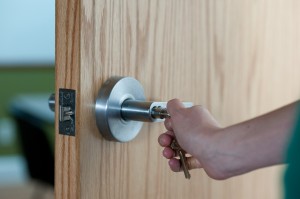 When it comes to doors and locks, we’re talking about things that obviously endure a lot of wear and tear on a daily basis. Add on to that the fact that, more often than not, a high-quality door or lock costs a pretty penny, and you have yourself a piece of hardware that you definitely want to be worth your hard-earned dollars. Granted, most hardware comes with a pretty solid warranty, but that doesn’t mean you shouldn’t at least try to take excellent care of your equipment, too.
When it comes to doors and locks, we’re talking about things that obviously endure a lot of wear and tear on a daily basis. Add on to that the fact that, more often than not, a high-quality door or lock costs a pretty penny, and you have yourself a piece of hardware that you definitely want to be worth your hard-earned dollars. Granted, most hardware comes with a pretty solid warranty, but that doesn’t mean you shouldn’t at least try to take excellent care of your equipment, too.
“But how, Whitney, does someone take ’care’ of a door?”
Well, I’m glad you asked. There are a few steps for scheduled maintenance we’re going to go over today that are going to allow you to keep your doors and locks well maintained and save you money in the long run. And who doesn’t like the sound of that?
A Well-Oiled Machine
We’ve all heard the phrase “it runs like a well-oiled machine,” and there’s a reason it’s so common – it’s true. And since the word “machine” is defined as “an apparatus using or applying mechanical power and having several parts, each with a definite function and together performing a particular task” your door certainly qualifies. All of which leads me back to my initial point of lubrication. It’s important! Sure, you can use WD-40 but it’s only a short-term lubricant and is mainly used for breaking parts free if they’ve become gummed up over time with mineral deposits or grime. By using a Teflon-based lubrication you’re extending the life of your hardware and saving some extra money along the way. Yay Teflon!
No Loose Parts
You’re also going to want to ensure that the door’s lock and components aren’t loose. If there are loose, exposed screws, tighten them up. Some of this scheduled maintenance can be done on your own, but there are other parts that will require a locksmith to tighten, as they may require a little dismantling of the lock to reach them.
Is it Working Correctly?
Having a door that doesn’t shut completely or latch correctly may seem like a minor issue, but in reality, it’s a big deal. You want to guarantee everything is closing properly and that all working parts are in order. Doing something as simple as adjusting your door closer for the correct swing will help keep the door from slamming. A slamming door can be damaging to both the door and the locking hardware so you want to get that fixed ASAP. Seriously, get on it.
A Clean Strike
A clean strike is a working strike. You need to check your strike on a regular basis to ensure that it isn’t clogged up with pieces of trash or dirt. Trash and dirt can clog up your strike and keep it from latching properly and prevent the lock from operating as desired. Not only can it cause damage, but if the strikes are obstructed, it will reduce the amount of security for your building.
Proper Grade Hardware
Ahh, the biggie. Having proper-grade hardware is HUGE when it comes to maintaining the quality of your doors and locks. Sure, you’re going to put a little more money up front, but in the long run, you’re going to be doing nothing but rake in the savings. Doors that are used heavily are obviously going to have a higher chance of damage, so it’s important to invest in some high-quality hardware here to go along with…what else? Scheduled maintenance. If you have an opening that gets heavy use, installing a grade 3 (residential grade) or grade 2 (light commercial) lock will reduce its life greatly. Always make sure that grade of lock meets the usage of that particular opening.
Now it’s your turn. What are the tips and tricks that you use to keep your doors and locks in good condition? We’d love to hear from you!

My husband and I just moved into a new house and are trying to find some good new locks for the house. I had no idea that to help maintain a lock that you should oil it. I’ll have to make sure that when we get a lock we keep it well oiled so that it will last a long time.